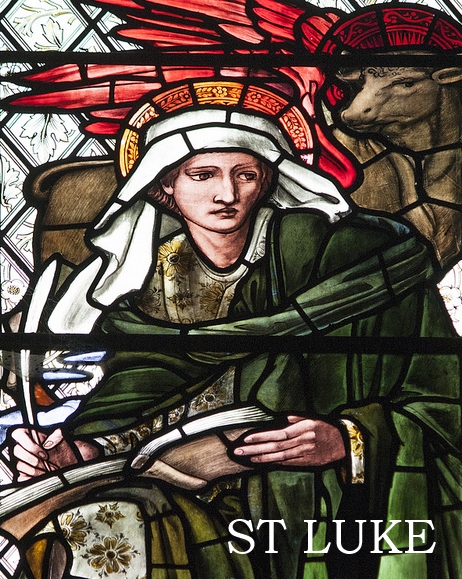St. Luke, being by nature of a noble and ardent mind, acquired in his youth the learning of the Greeks. He made himself perfectly acquainted with Grammar and Poetry, as well as complete mastery of the art of rhetoric and the power of persuasion. Nor was he surpassed by any one in the gifts of Philosophy; last of all, he learns Medicine. And now by his natural quickness of mind having drunk deep enough of human wisdom, he aims for something higher. He hastens accordingly to Judea,and gains access to the presence and hearing of Christ. Being soon convinced of the truth, he becomes a true disciple of Christ, and has frequent conversations with his Master. Hence it follows, "He wakeneth me at morn," (in my youth to secular wisdom). "At morn He wakeneth my ear" (to divine wisdom) "to hearken unto Him as my Master", i. e. Christ Himself. (Is. 50:4)
St. Luke, who was of Antiochian parentage and a physician by profession, and who was especially intimate with St. Paul and well acquainted with the rest of the apostles, has left us, in two inspired books, proofs of that spiritual healing art which he learned from them. One of these books is the Gospel, which he testifies that he wrote as those who were from the beginning eyewitnesses and ministers of the word delivered to him, all of whom, as he says, he followed accurately from the first. (Luke 1:2-3) The other book is the Acts of the Apostles which he composed not from the accounts of others, but from what he had seen himself.
St. Luke's style, in his Gospel as well as in the Acts of the Apostles, is more polished than that of the others, and has a tone of secular eloquence. Hence it is added, "The lord hath given me the tongue of the learned." (Is. 50:4) St. Luke dwells more than the other Evangelists upon the Priestly lineage and person of our Lord, and so he has been represented under the symbol of a calf, because that is the principal victim of the Priest. This book of the Gospel aptly answers to this by commencing as it does with the Priests, and ending in the calf, which taking upon itself the sins of men, was sacrificed for the life of the whole world. This sacrifice of the calf St. Luke also describes with greater fullness than the rest.
Lord God, who chose Saint Luke
to reveal by his preaching and writings
the mystery of your love for the poor,
grant that those who already glory in your name
may persevere as one heart and one soul
and that all nations may merit to see your salvation.
Through our Lord Jesus Christ, your Son,
who lives and reigns with you in the unity of the Holy Spirit,
one God, for ever and ever. Amen.
參考 References:
Catena Aurea (St. Thomas Aquinas)
Church History, Book III, Ch. 4 (Eusebius of Caesarea)
Lives of Saints (St. Simon the Translator)
Harmony of the Gospels, Book I, Ch.2 (St. Augustine)
St. Jerome
Prologue to the Gospel of Luke (St. Ambrose of Milan)
